On Friday 10 July, Migrating Texts at the IMLR hosted a workshop on adapting texts for radio with Jeremy Mortimer. Now a freelancer, Jeremy spent ‘decades’ writing and producing over 400 radio dramas with the BBC. In an equally fun-filled and informative afternoon, Jeremy led a group of 16 participants – including students, lecturers, publishers, and people preparing to start their own feminist radio station – through all the stages of turning a written text into a recorded drama.
Jeremy began by pointing out that even though the workshop was called ‘Adaptation for radio’, really we would be adapting for sound, as today there is nothing to stop you recording your own podcast at home and sharing it with the world. Unlike television, radio has a very fast turn around; you can have an idea in the morning and have listeners by the afternoon. The radio play is still a very popular genre, with the BBC Radio 4 afternoon slot attracting 750,000 listeners daily. As Jeremy underlined, the radio play is performed in the listeners’ heads, which means 750,000 different radio plays every day.
In Jeremy’s mind, there are only two rules:
1) Don’t bore your listener!
2) Be careful about how you confuse your listener (that doesn’t mean don’t confuse them – a little confusion is a good thing).
Other suggestions from participants included bearing in mind the attention span of listeners, but Jeremy countered that broadcasters are often too patronising and shouldn’t underestimate their listeners. The key to making a good radio drama is the resonance of the human voice. Referring to the prologue of Henry V, in which a sole voice creates epic battles, Jeremy affirmed that speaking directly to the audience, giving them something, is essential to successful radio drama. Using space and distance is also very important – you need to consider where to position your actors in relation to the microphone depending on whether you want them whispering in the listeners’ ears or shouting at them. Adding music can then increase the drama and direct the listeners’ emotions.
As for the question of fidelity, Jeremy asked “Fidelity to what?” Perspectives shift over time, so even if we stuck to Shakespeare’s words, our listeners would interpret his meanings in a very different way to that originally intended. On the other hand, an adaptation could sound very different and yet be very faithful to the spirit or effects of the source material. We should be less reverential when adapting, Jeremy insisted. He added that changing tenses is particularly important as past tense doesn’t work on radio!
Introductions to radio drama over, the real work began. We were divided into four groups and each given a text to adapt: two poems by Li Po, ‘Bringing in the Wine’ and ‘Chang Kan Village Song’; an extract from Rabelais’ Gargantua and Pantagruel; and the beginning of Gabriel García Márquez’s short story ‘The Handsomest Drowned Man in the World’. To download the texts, click here. We were challenged to write a script of roughly one minute, starting with our first impressions and the words jump off the page for us.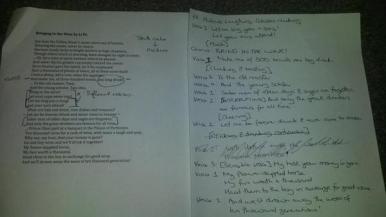
With the help of three seasoned radio drama performers, we then recorded our scripts.
If the embedded player does not work, please click here to listen on Soundcloud.
Having listened back to our recordings, we noted that physicality is very important; even though we can’t be seen, physically acting out the roles made for much livelier and more convincing recordings. As Jeremy reminded us, voices rely on bodies to work properly.
The afternoon ended with a final piece of advice from Jeremy: if you are interested in writing for radio, get out there and do it! Actually record your script so you have something to play people if you want them to commission you. Even if your ultimate aim is the BBC, you will need plenty of experience to get there, so try university or local radio stations or just start uploading podcasts from your home.

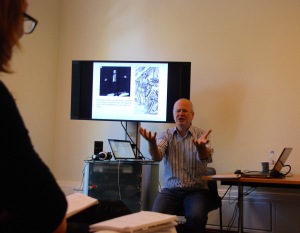
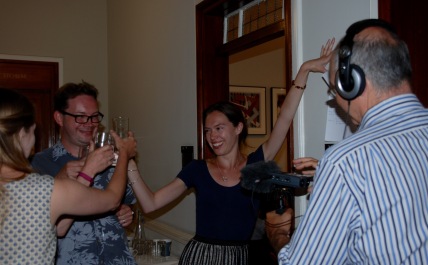
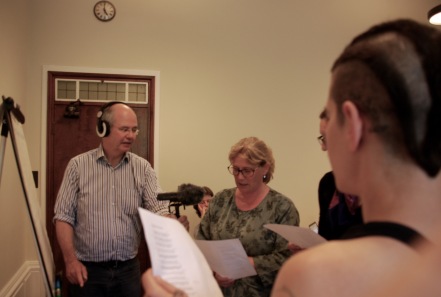
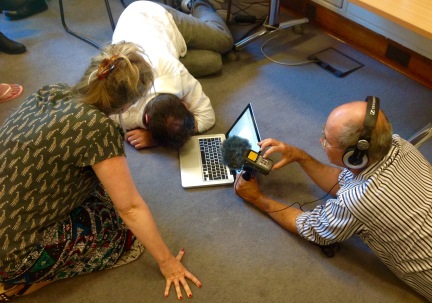
There’s nothing like hands-on experience guided by professional experts. Thanks Jeremy!
Fab work! Looking forward to the next workshop!